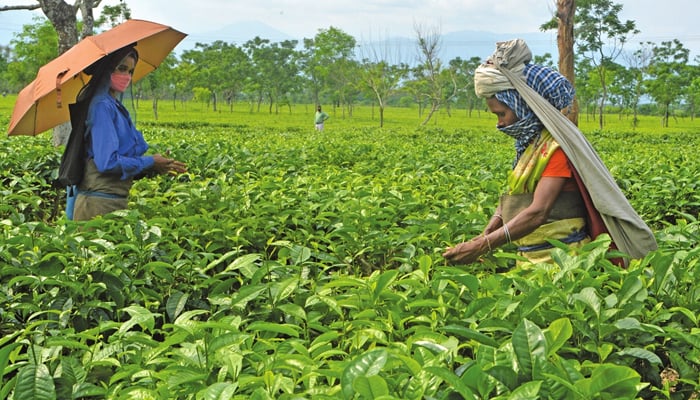Tea importers cry foul over tax exemptions for Azad Kashmir and tribal areas
Senior vice president of KCCI, says that commercial import of black tea was subject to a whopping 53% of taxes and duties
KARACHI: The Karachi Chamber of Commerce & Industry (KCCI) has called on the Federal Board of Revenue (FBR) to crack down on the rampant abuse of tax and duty exemptions granted to Azad Kashmir and the tribal areas of FATA and PATA, which they say are hurting the legitimate tea importers and causing a huge loss of revenue to the government.
Altaf A. Ghaffar, senior vice president of KCCI, said that the commercial import of black tea was subject to a whopping 53 percent of taxes and duties, while the importers from Azad Kashmir and FATA/PATA paid only 15 to 19 percent, resulting in a massive shift of imports to the exempted areas, which far exceeded their actual consumption.
"This discriminatory tax regime is an obvious anomaly and also a loss to the exchequer," Ghaffar said in a statement. He said that most of the tea imported by Azad Kashmir and FATA/PATA was sold to customers all over Pakistan, depriving the FBR of a major chunk of revenue.
Ghaffar said the importers of black tea paid Rs6.21 million of taxes and duties per container, while the Azad Kashmir and FATA/PATA importers paid only Rs1.65 million, which meant that the non-exempted importers were paying Rs4.56 million extra for a 20-feet container and double that amount for a 40-feet container.
"It is a sheer injustice being done to the legitimate importers of black tea, whose businesses have declined sharply over the last few years," Ghaffar said, adding that the black tea imported by Azad Kashmir and FATA/PATA with tax and duty exemptions was supposed to be sold only within those regions, but it was widely distributed all over Pakistan, affecting the businesses of the tea importers who generated revenue of Rs3.5 billion annually.
“Furthermore, anomalies have also been created under pressure of the large-scale processors/packers of Black Tea and different tax regimes have been created for commercial and industrial importers. In principle, the black tea in itself is a finished commodity and consumable without further processing. Both Commercial importers and industrial packers sell black tea without any change in form, hence it is not justifiable to charge different rates of Withholding Tax, Customs Duty and Sales Tax/ Value-Added Tax VAT etc.
This discriminatory tax regime is an obvious anomaly and also a loss to the exchequer.” He demanded that the tax exemption granted to Azad Kashmir and FATA/PATA be discontinued by the end of the current fiscal year and no further extension be given after June 2024, which would provide a level playing field to the black tea importers and enable them to compete in the local markets.
-
 Spencer Pratt Recalls Meeting Ryan Gosling Before Fame
Spencer Pratt Recalls Meeting Ryan Gosling Before Fame -
 Meghan Markle's As Ever Facing Branding Problems?
Meghan Markle's As Ever Facing Branding Problems? -
 Kate Middleton Is More Relaxed In 'Wellington Boots Than Diamond Tiara'
Kate Middleton Is More Relaxed In 'Wellington Boots Than Diamond Tiara' -
 Gaten Matarazzo Addresses Important Fans Query About 'Stranger Things'
Gaten Matarazzo Addresses Important Fans Query About 'Stranger Things' -
 Prince William's Latest Move Reveals Rift Is Strong With Prince Harry
Prince William's Latest Move Reveals Rift Is Strong With Prince Harry -
 Princess Eugenie Becomes Second Royal After Meghan To Feature In Viral Trend
Princess Eugenie Becomes Second Royal After Meghan To Feature In Viral Trend -
 Carol Burnett Sings Praises Of Late Jimmy Stewart: 'He Had THIS'
Carol Burnett Sings Praises Of Late Jimmy Stewart: 'He Had THIS' -
 Kate Middleton Dashes Through Rain At Windsor Castle
Kate Middleton Dashes Through Rain At Windsor Castle -
 Dave Filoni, Who Oversaw Pedro Pascal's 'The Mandalorian' Named President Of 'Star Wars' Studio Lucasfilm
Dave Filoni, Who Oversaw Pedro Pascal's 'The Mandalorian' Named President Of 'Star Wars' Studio Lucasfilm -
 Is Sean Penn Dating A Guy?
Is Sean Penn Dating A Guy? -
 Sebastian Stan's Godmother Gives Him New Title
Sebastian Stan's Godmother Gives Him New Title -
 Alison Arngrim Reflects On 'Little House On The Prairie' Audition For THIS Reason
Alison Arngrim Reflects On 'Little House On The Prairie' Audition For THIS Reason -
 Spencer Pratt Reflects On Rare Bond With Meryl Streep's Daughter
Spencer Pratt Reflects On Rare Bond With Meryl Streep's Daughter -
 'Stranger Things' Star Gaten Matarazzo Recalls Uncomfortable Situation
'Stranger Things' Star Gaten Matarazzo Recalls Uncomfortable Situation -
 Gaten Matarazzo On Unbreakable Bonds Of 'Stranger Things'
Gaten Matarazzo On Unbreakable Bonds Of 'Stranger Things' -
 Beyonce, Jay-Z's Daughter Blue Ivy Carter's Massive Fortune Taking Shape At 14?
Beyonce, Jay-Z's Daughter Blue Ivy Carter's Massive Fortune Taking Shape At 14?




